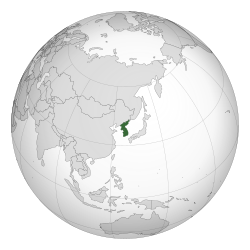Provisional Government of Korea
| Provisional Government of the Republic of Korea | ||||||||||||
| 대한민국 임시정부 / 大韓民國 臨時政府 | ||||||||||||
| Government in exile | ||||||||||||
|
||||||||||||
|
Motto "대한독립만세!" (Korean) "Long Live Korean Independence!" |
||||||||||||
|
Anthem "Aegukga" |
||||||||||||
|
Map of the Korean Peninsula, occupied by Japan.
|
||||||||||||
| Capital | Hanseong 1945–1948 (de jure) | |||||||||||
| Capital-in-exile |
Shanghai 1919-1932 Chongqing 1940-1945 |
|||||||||||
| Languages | Korean | |||||||||||
| Government |
Presidential (1919–1925) Parliamentary (1925–1940) Presidential (1940–1948) (All 3 Formed a Provisional Government) |
|||||||||||
| President | ||||||||||||
| • | 1919–1925 | Syngman Rhee | ||||||||||
| • | 1927–1933 1935–1940 |
Yi Dongnyeong | ||||||||||
| • | 1926–1927 1940–1948 |
Kim Gu | ||||||||||
| Prime Minister | ||||||||||||
| • | 1919–1921 | Yi Donghwi | ||||||||||
| • | 1924–1925 | Park Eunsik | ||||||||||
| • | 1944–1945 | Kim Kyu-sik | ||||||||||
| Historical era | Early 20th century | |||||||||||
| • | Nationwide civil resistance | 1 March 1919 | ||||||||||
| • | Constitution | 11 April 1919 | ||||||||||
| • | Government proclaimed | 13 April 1919 | ||||||||||
| • | Hongkou Park Incident | 29 April 1932 | ||||||||||
| • | War declared | 10 December 1941 | ||||||||||
| • | Surrender of the Empire of Japan | 15 August 1945 | ||||||||||
| • | Republic of Korea established | 15 August 1948 | ||||||||||
| Currency | Won | |||||||||||
|
||||||||||||
| Today part of |
|
|||||||||||
| Provisional Government of the Republic of Korea | |
| Hangul | |
|---|---|
| Hanja | |
| Revised Romanization | Daehanmin(-)guk Imsijeongbu |
| McCune–Reischauer | Taehanmin'guk Imsijŏngbu |
The Provisional Government of the Republic of Korea was a partially recognized Korean government-in-exile, based in Shanghai, China, and later in Chongqing (then spelt Chungking), during the Japanese Korean period.
The government was formed on April 13, 1919, shortly after the March 1st movement of the same year during the Imperial Japanese colonial rule of the Korean peninsula.
The government did not gain formal recognition from world powers, though a modest form of recognition was given from the Nationalist Government of China and a number of other governments, most of whom were in exile themselves.
The government resisted the colonial rule of Korea that lasted from 1910 to 1945. They coordinated the armed resistance against the Japanese imperial army during the 1920s and 1930s, including the Battle of Chingshanli in October 1920 and the assault on Japanese military leadership in Shanghai in April 1932.
This struggle culminated in the formation of Korean Liberation Army in 1940, bringing together many if not all Korean resistance groups in exile. The government duly declared war against the Axis powers Japan and Germany on December 9, 1941, and the Liberation Army took part in allied action in China and parts of Southeast Asia.
During World War II, the Korean Liberation Army was preparing an assault against the Imperial Japanese forces in Korea in conjunction with American Office of Strategic Services, but the Japanese surrender prevented the execution of the plan. The government's goal was achieved with Japanese surrender on September 2, 1945, but they were not approved by other governments as a member of allied nations, who signed peace treaty with Japan in San Francisco.
...
Wikipedia



